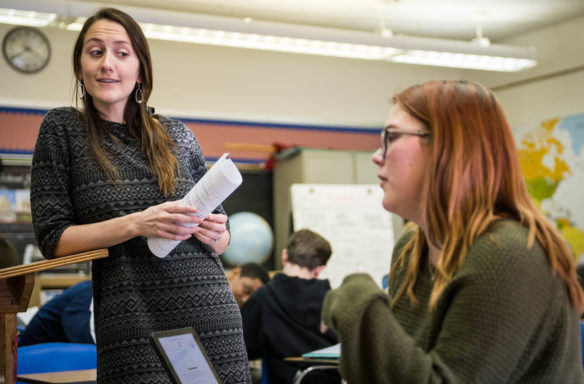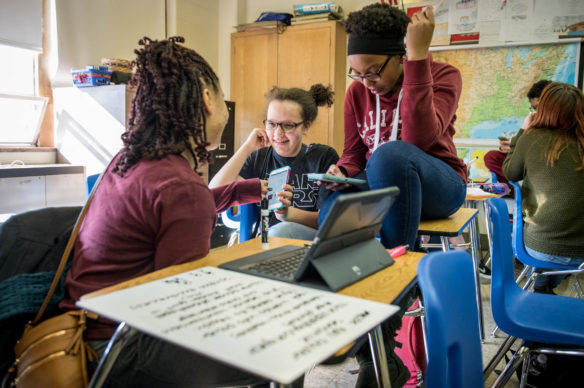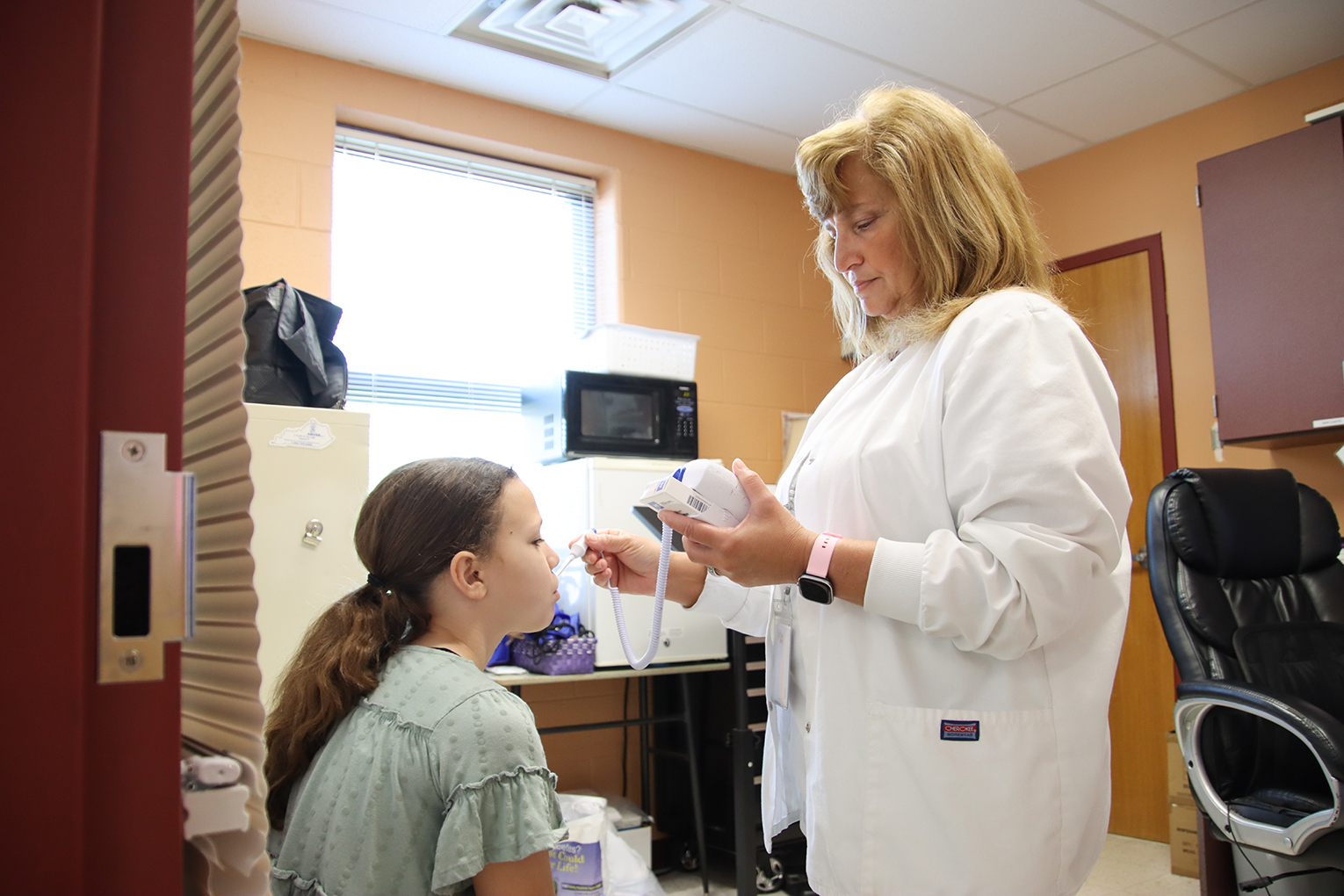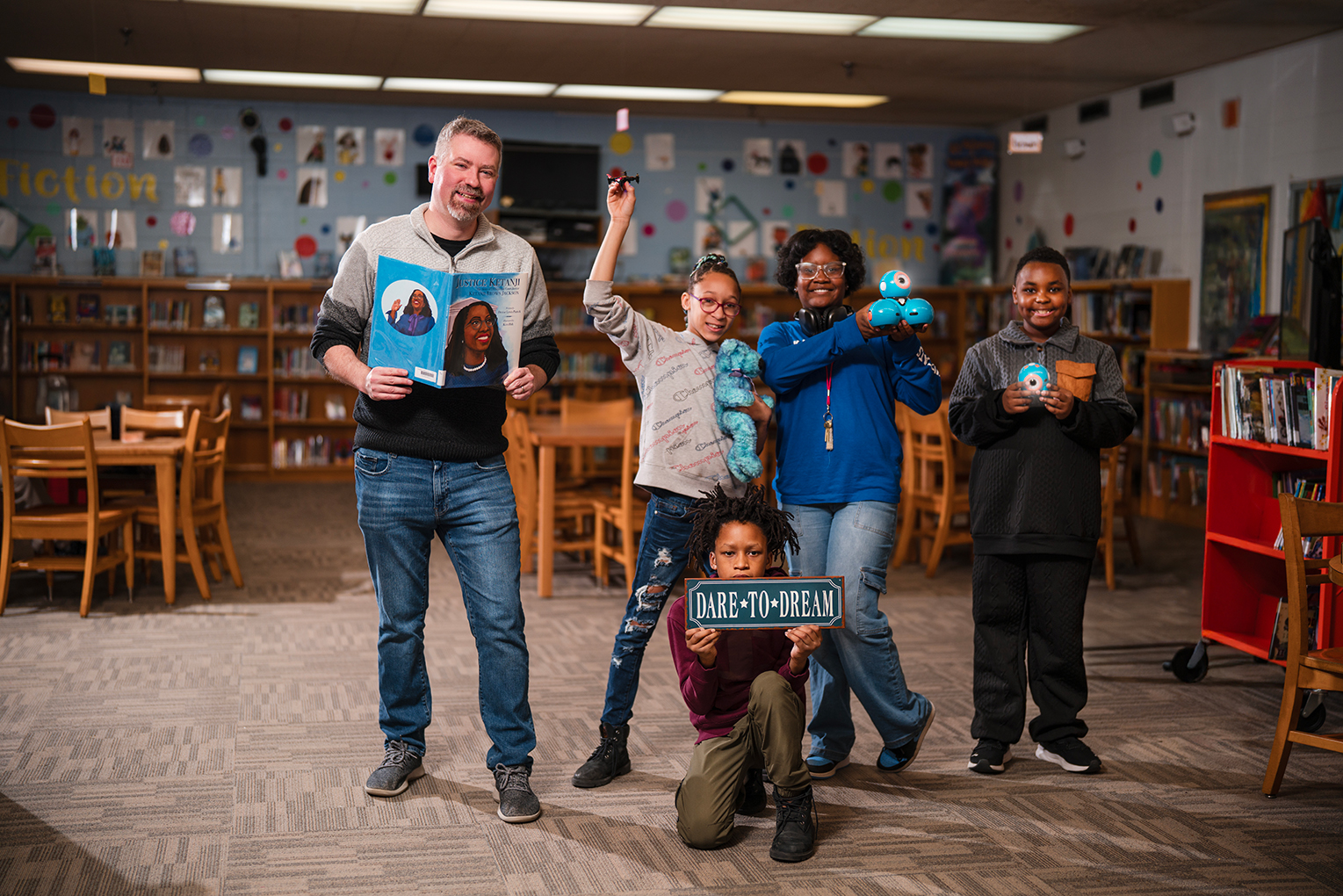
Elizabeth Byron, left, talks to freshman Ella Pena during Byron’s Advanced Placement Human Geography class at the J. Graham Brown School (Jefferson County). Byron’s class includes the AP with the WE Service component, which incorporates service learning into AP courses.
Photo by Bobby Ellis, Jan. 25, 2018
By Mike Marsee
michael.marsee@education.ky.gov
Somewhere in South Sudan, a well will soon be dug for a village where the people desperately need access to fresh water. And in downtown Louisville, students in an Advanced Placement class are working today to make it possible.
Their class is part of a program that incorporates service learning into AP courses. The program takes student learning to another level by allowing them to apply their classroom work to the real world to address social issues.
“It has dramatically changed how my students are accessing the material now,” said Liz Byron, who teaches AP Human Geography at The J. Graham Brown School (Jefferson County). “Instead of studying what a food desert is or hunger in the world, now they’re actually looking to create sustainable solutions, to raise awareness.”
The program, AP with WE Service, combines the rigor of AP courses with the service-based learning programs of WE.org, an international organization that utilizes youth and families in thousands of local and global causes. AP offers the program in six of its courses: Computer Science A, Environmental Science, European History, Human Geography, Spanish Language and Culture, and Studio Art: 2-D Design.
More than volunteering or community service, AP with WE Service provides teaching modules that align to AP course content and can be implemented into an AP course curriculum. Teachers and students focus on a single topic such as hunger or education and identify, plan and execute local and global service opportunities that require hands-on innovation and problem-solving.
“This takes a course from the classroom and turns it into a lifestyle of service to others for our students,” Byron said. “It helps them put a why behind the numbers, put human lives behind the numbers, so they can go forward from here and know that they can have solutions for the world.”
AP with WE Service is offered in only a few Kentucky public schools. It is incorporated into AP Human Geography courses taught by Byron at the Brown school, and by Allison Hunt and Merritt Robinson at duPont Manual High School.
“It’s no secret that connecting educational experiences to real-world scenarios is a highly effective way to increase student engagement. Combining these best practices with the rigorous coursework required of students taking AP courses is an excellent way to promote academic excellence while simultaneously instilling the value of service learning in our future leaders,” said Jennifer Pusateri, the AP state coordinator for the Kentucky Department of Education.
Byron said she would encourage other AP teachers to adopt the program.
“It’s not an addition to their work. It’s something that will actually fit right into what they’re doing and give their course more direction. It’ll ultimately help their students on the AP exam,” she said.
Byron launched the program last year at Brown, and she said she discovered in that first year that her students’ performance on the free-response questions in the AP exam improved over previous years.
“In a lot of classes you have people who don’t raise their hand, but thanks to this, everyone is participating, everyone is doing something,” freshman Aidan Herrlinger said. “It’s not just those couple of people in the class who always raise their hands and answer the questions. Everyone’s getting involved. It’s a great way to teach all students.”

Students Nasia Craft, Skylar Dragoo and Ziona King, left to right, work on their a project focused on advancing women during their AP Human Geography class at the J. Graham Brown School (Jefferson County). Students in an AP course with the WE service learning component address local and global concerns that require hands-on innovation and problem-solving.
Photo by Bobby Ellis, Jan. 25, 2018
Skylar Dragoo, another Brown freshman, said it’s a difficult class but it’s easy to stay engaged.
“I think it has allowed us to have a hands-on experience instead of just doing class work,” she said. “It’s one of those experiences that is going to stick with us.”
Manual participated in the first year of a pilot program for AP with WE Service in the 2015-16 school year. Hunt and Robinson helped develop some of the modules to integrate service learning into the AP Human Geography curriculum for The College Board, which oversees the AP program.
This year, 310 students will complete the service learning component in AP Human Geography classes at Manual. To do so, they must participate in at least 20 hours of service, working both in class and out of class and on both local and global issues. They are evaluated at several stages of their service-learning project.
At Manual, teams of four to six students choose the issue they will address – food- or health-related – and research organizations carefully before picking the one on which they will base their campaigns.
Hunt said students must engage in direct service and all of the service activity must take place outside the school. For instance, a group of students who are concentrating on dance held a dance clinic for younger girls, using that event as a fundraiser to help combat hunger issues in the community.
“We’ve seen all kinds of things, because they’re truly totally student-designed projects,” she said. “Sometimes that causes angst for teachers, but it is very empowering for the students.”
Students took on a number of global projects in the first year the program was offered at Brown, but they have focused on a single project this year. They chose their project after reading “They Poured Fire on Us From the Sky: The True Story of Three Lost Boys from Sudan,” which highlights the importance of clean water in that area.
“The students made it their project goal to make a well in South Sudan for a village,” Byron said. “We’ve talked about what a well will do: It can be used for irrigation, it provides clean water for cooking, it allows students to be in school longer because they don’t have to travel to get water for their families.”
Byron said the students’ work has crossed into other classes as well, including English classes in which they have written about their project and physics classes in which they have built solar cookers.
“We’ve really made it a schoolwide effort,” she said. “It makes a difference letting the students choose their own projects, not forcing something on them.”
She said students must divide their time between the local and global concerns, but they get to choose how that time will be divided. As of late January, the students had raised about three-quarters of their pledged amount of $4,250 for the well in South Sudan, which will cover about half of the construction cost.
Other groups of students have focused more of their efforts on issues in Louisville. One team’s focus has been on creating a social media campaign designed to raise awareness about food deserts and hunger in the community. Their efforts have led to an Instagram page to which they regularly post information about healthy food choices.
Byron said the WE Service component is ideal for a course such as AP Human Geography.
“The course in general is all about current events and what’s going on in the world,” she said. “For me, student learning is so much more influential when they can put it into action.”
Hunt said she thinks the program could be beneficial for students in any school.
“The problems are so broad, unfortunately, that you see them everywhere,” she said. “Issues of food security and access to health can be interpreted in a multitude of ways, and they encompass every type of population you can imagine.
“It’s just identifying needs and having students do problem-solving and looking at the local and global communities. If you keep that focus, it’s not as overwhelming.”
MORE INFO …
Liz Byron elizabeth.byron@jefferson.kyschools.us
Allison Hunt allison.hunt@jefferson.kyschools.us
Jennifer Pusateri jennifer.pusateri@education.ky.gov




Great article, Mr. Marsee. I taught Liz in high school and it was very uplifting to see her taking her talents to broaden the education of her students beyond the textbook. I am a very proud teacher!
Thanks for sharing.